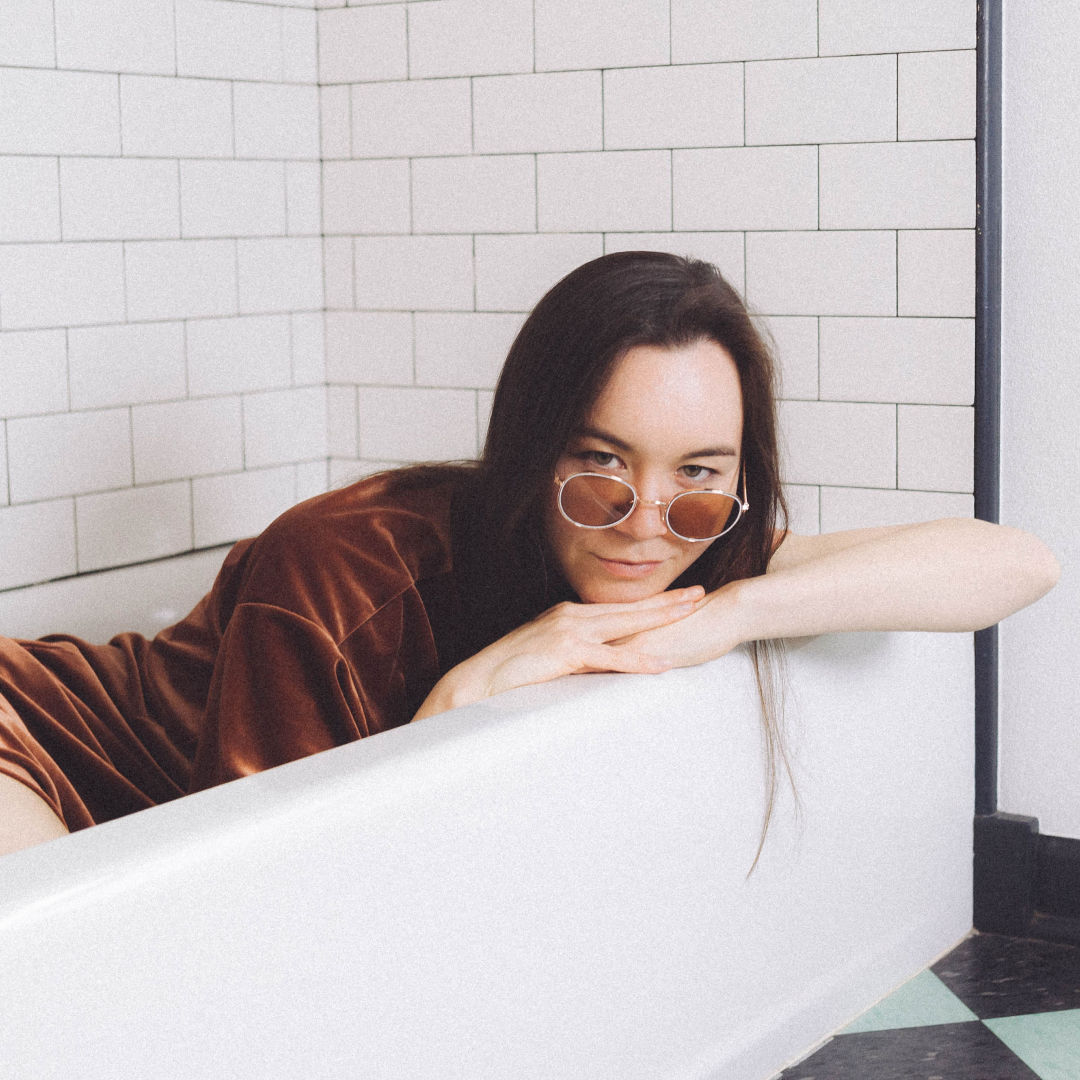MAITA on Open Mics, Avoiding Clichés, and Straining to Feel Wild

Maria Maita-Keppeler of MAITA
Image: Tristan Paige
Above all, Maria Maita-Keppeler is thoughtful. The leader of MAITA, a Portland four-piece who assembled to put out 2020's Best Wishes (our favorite local record of that year), Maita-Keppeler's songs are brainy and deliberate.
On MAITA's sophomore record, I Just Want to Be Wild for You (which dropped February 18 on Kill Rock Stars), she examines her own thoughtfulness. As the title suggests, it's full of stabs at transcendence, following characters desperate to break out of their heads and into their bodies. (There's also plenty of space for dry, delicious humor.) Just before the album hit streamers and record stores, we caught up with Maita-Keppeler on Instagram Live. Read a condensed version of our conversation below, and scroll all the way down to view the full interview.
PORTLAND MONTHLY: First of all, I wanted to thank you on behalf of everyone who's ever felt sad in a beautiful city overseas for writing "Loneliness," the opening track on this record. I understand it was inspired by some time you spent in Kyoto, and I wanted to hear you talk about that and how you channeled it into this song.
MARIA MAITA-KEPPELER: This song was actually an open mic prompt at the Laurelthirst in Portland. The prompt was "reflection," and for whatever reason, I remembered seeing my reflection in a storefront window in Kyoto.
At the time of writing the song, this was already several years in my past, so it was [a matter of] mining these memories that wouldn't go away of this intense, intense loneliness that I felt when I was there, just because it was such a wild environment. It was really hot, I wasn't getting enough sleep, I was living alone, I was studying alone, I had no friends, and it was really difficult to make friends. I speak Japanese fluently, but it doesn't really look like it—at least in Japan—and so I don't think people assumed that I could speak it. That was hard, because I felt more at home there, and I didn't really feel like being an American tourist all the time, and I wanted to actually, like, make real connections.
Throughout this record, you approach potentially general things—loneliness, touring on "Road Song," cell phones on "Light of My Life," Southern California in "Pastel Concrete"—but you come at them from such a fresh, incisive lyrical perspective that they feel new. Maybe I'm just betraying my own insecurities as a writer, but I'm curious: How consciously are you subverting tropes and avoiding staleness when you write about something that is maybe well-covered?
I like that question, because I don't know that I think about it too much. But it is hard. One thing I sometimes do is, when you think about a phrase that feels very clichéd, think about why it feels clichéd, and really dig into it. Be like, 'What's true? No, what's really the truth? No, what are you really trying to say?’
An exercise that I like a lot is to go to somewhere, like an open mic or a pop show or something, and listen to lyrics for things that don't connect with you rather than things that you're inspired by. And if you hear a line that's kind of cheesy, or you feel like is not super special, think about what they're saying and think like, ‘Well, if I was to actually say the truth about this line, what would it be?’
A lot of these songs feel like diptychs. There's a song, "You Sure Can Kill a Sunday," which is literally split in two; "Ex-Wife" starts serene and ends up pummeling; "Road Song" opens with all these disparate images and then ends with a repeated refrain that gets louder and louder. Is it just the magic of songwriting that those are the songs you end up writing, or are you consciously saying, 'I like two-part songs, and this is why'?
It's not necessarily two-part songs, but I really like songs to have journeys. I like songs to have phases. I think a lot of it comes from back when I used to play solo a lot and I didn't have a band, and that there was always a little bit of insecurity of being able to hold down a song just with one person and one guitar. I would be like, ‘I have to make this exciting, I have to take people on a journey.’ And so then I would write the songs that had these builds in them, or these climaxes, or these acts, basically.
But what I've come to find is, first of all, that makes it so fun to play with a band, because then you can really get this full scope. And second of all, I do really like that it allows for some emotional diversity within each certain subject matter, because you might go two different ways about the same thing at different times, and that allows one song to capture both ways that you feel.
I don't think that you can spoil albums, narratively, but here goes: the last line on this record is the title. Was that always in your head? Were you like, ‘I'm building toward this statement,’ or did it come organically?
The funny thing about "Wild for You" as a song is that it was supposed to go on [our debut album] Best Wishes. We tracked it for Best Wishes, and then we just weren't that happy with what we got and we wanted to do it again, so we ended up doing it again for this one. At the time, I was already writing the next batch [of songs] that would become this record, and I was like, "Wild for You" is gonna fit well with the theme of these other songs, which all center around disconnect and feeling out of place or displaced and trying to navigate your own emotions.
"Wild for You" is a song about the last stages of a relationship before it ends, basically, and how there's a lot of nostalgia and there's a lot of intense feelings in trying to revive something, but a lot of the barriers to that come from your own feelings, or your own lack of feelings. So it's this like, "I just want to be wild for you," which suggests that you aren't, but you wish you were. And I think that's just, like, the saddest thing.
The cover art is this very striking photograph. It's you from behind laying on the couch. It feels very February to me: the blinds are drawn, but you're in red, so it's like, 'It's Valentine's Day, but also I'm depressed.' Who took it, and when did you say, 'Yep, that's the image that I want to lead with’?

I Just Want to Be Wild for You's album cover
Image: Tristan Paige
That photo was taken by Tristan Paige, who's a photographer in Astoria, Oregon. I love taking photos with her. She's amazing. Go follow her. I liked that it was a really good juxtaposition with the title, and it kind of helps send home this idea that there's exuberance—"wild for you" is an exuberant statement—but there's also that tinge of, ‘Wait, something isn't quite right. Something isn't 100 percent full send. What's stopping us here?’ And I liked that the back to the camera kind of had that feeling that there's a lack of connection present.
Pivoting to some more general stuff. It's almost a stupid question, but I'm curious: How did you become a musician in the first place? What's your journey toward music been?
I kept on trying to teach myself guitar and failing. And at one point, I was told that I wasn't very good at singing, so I just kind of set myself into development because I was a sensitive nine-year-old. And then when I started driving, when I got my license, I had this private little box that I could practice in. And it coincided with falling in love with these artists like Cat Power and Regina Spektor and Feist, who were providing these avenues of singing that I didn't really know existed, and realized were a lot more compatible with my voice as opposed to what was playing on the radio. Because it's just you know, you might not see yourself in a Christina Aguilera vocal.
I mean, speak for yourself. I can do a flawless "Genie in a Bottle," but continue.
You're right, I'm sorry. But yeah, when I learned to drive, that's kind of when I learned to sing. And then that's when the juices started flowing for learning guitar and sticking with it, and to start songwriting. Then that fed into starting to play at open mics.
And I love open mics. They're amazing. Everyone who's not sure where to start, open mics are where I would suggest, because the people that end up sticking with it in that open mic often end up being your community when you come out. Those are going to be your peers, those are going to be the next crop of artists in a town.
A question from the audience: How has Oregon or Portland or the Pacific Northwest inspired your songwriting?
A lot of the artists from this area have inspired me. I feel like there's something in the air, and maybe it's from having these long dark winters to do a lot of our songwriting during, and then this grayness that we can kind of all take some inspiration from, and have to be inside and get a little introspective. And then we have these bursts of summer where we can go and collect experiences, that then we ruminate on and regret, or not regret, or just play over and over in our heads throughout the winter. So I think that's something about this area that has a lot of people inspired. I always write really well when I go have a crispy, cool writing session in a cabin in the woods, it's a really good place to to get some songs out. So this is kind of the environment for that.
Catch the full Q&A from February 17's Instagram Live below:




